

Intuition Pumps: Daniel Dennett on the Dignity and Art-Science of Making Mistakes. By Maria Popova “The chief trick to making good mistakes is not to hide them — especially not from yourself.”
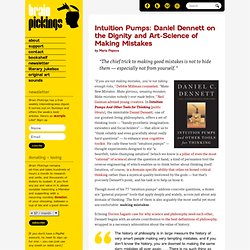
“If you are not making mistakes, you’re not taking enough risks,” Debbie Millman counseled. “Make New Mistakes. Make glorious, amazing mistakes. Make mistakes nobody’s ever made before,” Neil Gaiman advised young creators. How to Find Fulfilling Work. 20-Year-Old Hunter S. Thompson’s Superb Advice on How to Find Your Purpose and Live a Meaningful Life. As a hopeless lover of both letters and famous advice, I was delighted to discover a letter 20-year-old Hunter S.
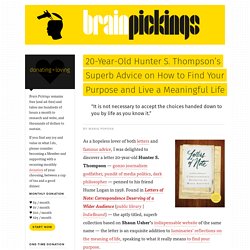
Thompson — gonzo journalism godfather, pundit of media politics, dark philosopher — penned to his friend Hume Logan in 1958. Found in Letters of Note: Correspondence Deserving of a Wider Audience (public library | IndieBound) — the aptly titled, superb collection based on Shaun Usher’s indispensable website of the same name — the letter is an exquisite addition to luminaries’ reflections on the meaning of life, speaking to what it really means to find your purpose. Cautious that “all advice can only be a product of the man who gives it” — a caveat other literary legends have stressed with varying degrees of irreverence — Thompson begins with a necessary disclaimer about the very notion of advice-giving: A Guide to Getting Lost: How We Find Ourselves. By Maria Popova “The things we want are transformative, and we don’t know or only think we know what is on the other side of that transformation… Never to get lost is not to live.”
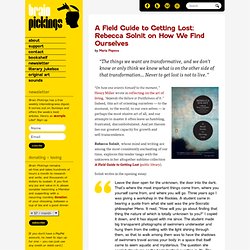
“On how one orients himself to the moment,” Henry Miller wrote in reflecting on the art of living, “depends the failure or fruitfulness of it.” Indeed, this act of orienting ourselves — to the moment, to the world, to our own selves — is perhaps the most elusive art of all, and our attempts to master it often leave us fumbling, frustrated, discombobulated. And yet therein lies our greatest capacity for growth and self-transcendence. Rebecca Solnit, whose mind and writing are among the most consistently enchanting of our time, explores this tender tango with the unknown in her altogether sublime collection A Field Guide to Getting Lost (public library). Solnit writes in the opening essay: Leave the door open for the unknown, the door into the dark. How do you calculate upon the unforeseen? Donating = Loving. AlbertCamus:Happiness,Unhappiness,Self-Imposed Prisons.
By Maria Popova “Those who prefer their principles over their happiness, they refuse to be happy outside the conditions they seem to have attached to their happiness.”
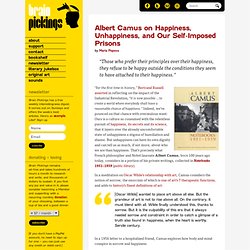
“For the first time in history,” Bertrand Russell asserted in reflecting on the impact of the Industrial Revolution, “it is now possible … to create a world where everybody shall have a reasonable chance of happiness.” Do Scientists Pray? Einstein Answers a Little Girl’s Question about Science vs. Religion. Women in Science: Einstein’s Advice to a Little Girl Who Wants to Be a Scientist. The Secret to Learning Anything: Albert Einstein’s Advice to His Son. IntuitionvsRationality:Einstein,Jobs,AnneLamott. Why War: Einstein and Freud’s Little-Known Correspondence on Violence, Peace, and Human Nature. By Maria Popova “Every man has a right over his own life and war destroys lives that were full of promise.”

Despite his enormous contributions to science, Albert Einstein was no reclusive genius, his ever-eager conversations and correspondence engaging such diverse partners as the Indian philosopher Tagore and a young South African girl who wanted to be a scientist. In 1931, the Institute for Intellectual Cooperation invited the renowned physicist to a cross-disciplinary exchange of ideas about politics and peace with a thinker of his choosing. He selected Sigmund Freud, born on May 6, 1856, whom he had met briefly in 1927 and whose work, despite being skeptical of psychoanalysis, the legendary physicist had come to admire.
A series of letters followed, discussing the abstract generalities of human nature and the potential concrete steps for reducing violence in the world. When Einstein Met Tagore. Change Your Beliefs About Yourself to Form Better Habits. 13 Things to Remember When Life Gets Rough. We’ve all gone through hard times.
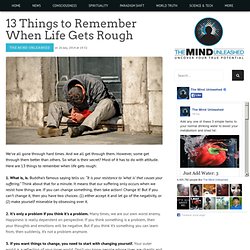
And we all get through them. However, some get through them better than others. So what is their secret? Develop Your Mental Toughness. Albert Camus on Resilience. Mark Twain’s Top 9 Tips For Living A Kick-Ass Life. You may know Mark Twain for some of his very popular books like Adventures of Huckleberry Finn and The Adventures of Tom Sawyer.
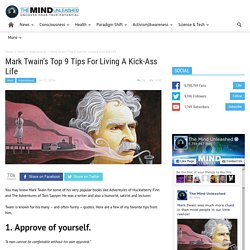
He was a writer and also a humorist, satirist and lecturer. Twain is known for his many – and often funny – quotes. Here are a few of my favorite tips from him. 1. Life Purpose? Escape Your Bubble. 30 Things to Stop Doing to Yourself. Presence, Not Praise: Achievement. By Maria Popova Why instilling admiration for hard work rather than raw talent is the key to fostering a well-adjusted mind.
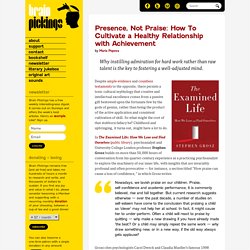
Despite ample evidence and countless testaments to the opposite, there persists a toxic cultural mythology that creative and intellectual excellence comes from a passive gift bestowed upon the fortunate few by the gods of genius, rather than being the product of the active application and consistent cultivation of skill. So what might the root of that stubborn fallacy be? The Psychology of Your Future Self and How Your Present Illusions Hinder Your Future Happiness.
The Sting of Success. Liars and Deceivers. Creativity, Gift of Failure, Success vs Mastery. By Maria Popova The lost art of learning to stand “where we would rather not and expand in ways we never knew we could.”
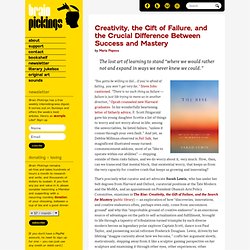
“You gotta be willing to fail… if you’re afraid of failing, you won’t get very far,” Steve Jobs cautioned. “There is no such thing as failure — failure is just life trying to move us in another direction,” Oprah counseled new Harvard graduates. Young Steve Jobs: Other People Not Being Smarter Than You. Steve Jobs: So the thing I would say is when you grow up, you tend to get told that the world is the way it is and your life is just to live your life inside the world, try not to bash into the walls too much, try to have a nice family life, have fun, save a little money, but that's a very limiting life.
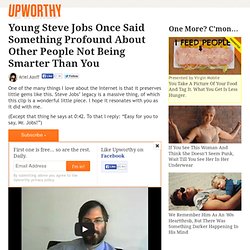
Life can be much broader once you discover one simple fact and that is everything around you that you call life was made up by people that were no smarter than you, and you can change it, you can influence it, you can build your own things that other people can use. Children’s Endearing Letters to Judy Blume About Masturbation, and the Beloved Author’s Response. By Maria Popova “Dear Judy, I want to ask you a very important question…” In 1879, Mark Twain delivered a brilliant satirical lecture about masturbation, mocking the cultural hypocrisies around a practice so prevalent, so natural, yet so condemned.
Nearly 130 years later, science writer extraordinaire Mary Roach traced the perilous religious roots of these hypocrisies. But the most poignant reflections on the subject come from those that suffer from such stigmas most acutely and with the least social support available: children. It’s no surprise, then, that kids whose parents and teachers either don’t address the subject or shroud it in censorship and condemnation would look for solace elsewhere. Judy Blume signing a copy of Deenie (photograph by Mariah Jasmine Bonifacio) Dear Judy,I read your book Deenie. When you are choosing books about sexuality for your kids make sure that there is an honest discussion of masturbation included.
Joan Didion on Keeping a Notebook. By Maria Popova “We are well advised to keep on nodding terms with the people we used to be, whether we find them attractive company or not.” As a lover — and keeper — of diaries and notebooks, I find myself returning again and again to the question of what compels us — what propels us — to record our impressions of the present moment in all their fragile subjectivity. From Joan Didion’s 1968 anthology Slouching Towards Bethlehem (public library) — the same volume that gave us her timeless meditation on self-respect — comes a wonderful essay titled “On Keeping a Notebook,” in which Didion considers precisely that.
Though the essay was originally written nearly half a century ago, the insights at its heart apply to much of our modern record-keeping, from blogging to Twitter to Instagram. Malcolm Gladwell on Criticism, Tolerance, and Changing Your Mind. By Maria Popova “That’s your responsibility as a person, as a human being — to constantly be updating your positions on as many things as possible. And if you don’t contradict yourself on a regular basis, then you’re not thinking.” At a recent event from the New York Public Library’s wonderful LIVE from the NYPL series, interviewer extraordinaire Paul Holdengräber sat down with Malcolm Gladwell — author of such bestselling books as The Tipping Point: How Little Things Can Make a Big Difference (public library), Blink: The Power of Thinking Without Thinking (public library), Outliers: The Story of Success (public library), and his most recent, David and Goliath: Underdogs, Misfits, and the Art of Battling Giants (public library) — to reflect on his career, discuss the aspects of culture that invigorate him with creative restlessness, and update his 7-word autobiography.
What we call tolerance in this country, and pat ourselves on the back for, is the lamest kind of tolerance.